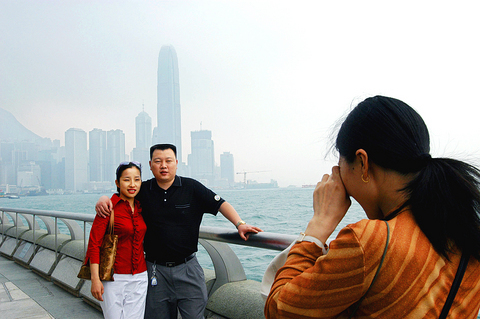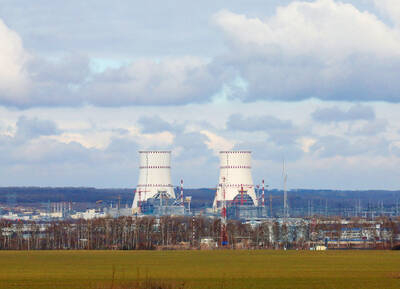As Hong Kong's storied harbor-front skyline disappears beneath a cloud of thickening pollution, its leaders are being accused of ignoring a problem activists say it could soon be too late to fix.
While environmental, tourism and business lobbies urge the government to take action to restore Hong Kong's formerly clear skies, Chief Executive Donald Tsang (
In comments on the radio and during a major speech to businessmen, Tsang stressed the problems of murky skies caused by rising smog rather than evidence that emissions are causing severe health problems.

PHOTO: AP
"Why do people feel that they don't see, that the air is poorer? It is a question of visibility," Tsang told a phone-in program on local RTHK radio over the weekend.
"Is the air right? Not so," he said. "Small particulates, which [are] coming from the mainland [China] may not affect us or [what] we breathe, but it affects our feeling that the air is not as good as before," he said.
Later, in a speech to the Hong Kong General Chamber of Commerce, he reiterated his position by trying to separate the issue of visibility from air quality.
"Visibility, of course, is a question of degree. We are talking about small particulates. Do not equate visibility directly with just very bad air. We are doing our best. Visibility is important. What about blue skies? Blue skies implies visibility and for that reason that certainly is my priority," he said.
Activists were quick to pounce, saying the China-backed chief executive had missed the point and accusing his government of being out of touch.
"It just shows the low level of understanding of the issue at the highest levels of government," said Christine Loh (
"The government is in a state of denial," Loh added. "If they don't understand how bad things are, then they won't be able to work fast enough to solve the problem."
Pollution has become a hot political issue in Hong Kong as smog levels have risen to often dangerous levels. Poor air quality cut visibility to less than 1km on more than 50 days last year.
More worrying, however, is evidence from the medical community that pollution-related illnesses such as bronchitis and asthma are claiming lives in ever greater numbers.
The key tourism industry is also complaining about the problem, with a tour guides association saying 10 percent of customers had gone down with smog-related illnesses while holidaying there.
And international chambers of commerce have issued warnings that their member businesses are pulling out of the city or deciding not to locate here because of the health implications for their staff.
While the pollution problem is mostly due to factories across southern China's booming manufacturing center in Guangdong Province, local coal-burning power stations and diesel-powered buses are also major contributors.
Although the Hong Kong government recently launched an "Action Blue Sky" campaign to persuade citizens to cut down on air conditioner use and slash energy consumption, critics say it is too little, too late.
Tsang came under renewed fire last week when, in his annual state-of-the-territory policy address, he claimed to place air quality at the top of his political agenda without offering any new initiatives.
He has also been criticized for claiming Hong Kong was unlikely to reach emissions targets set recently by the WTO.
"This is not the sort of defeatist thing we want to hear from our leaders," said Paul Zimmerman, head of a high-profile pressure group dedicated to improving the quality of life in Hong Kong.
"If they are not prepared to do anything, how can they expect the citizens to try?" he asked, adding that there seemed to be a "cynical" plot going on.
"The government doesn't want to put any initiatives forward because it simply doesn't want to have to do anything. This is a problem that is going to take a lot of knuckling down and hard negotiating with China," said Zimmerman, who was also on the radio phone-in show with Tsang.

Philippine President Ferdinand Marcos Jr has fired his national police chief, who gained attention for leading the separate arrests of former Philippine president Rodrigo Duterte on orders of the International Criminal Court and televangelist Apollo Carreon Quiboloy, who is on the FBI’s most-wanted list for alleged child sex trafficking. Philippine Executive Secretary Lucas Bersamin did not cite a reason for the removal of General Nicolas Torre as head of the 232,000-member national police force, a position he was appointed to by Marcos in May and which he would have held until 2027. He was replaced by another senior police general, Jose

STILL AFLOAT: Satellite images show that a Chinese ship damaged in a collision earlier this month was under repair on Hainan, but Beijing has not commented on the incident Australia, Canada and the Philippines on Wednesday deployed three warships and aircraft for drills against simulated aerial threats off a disputed South China Sea shoal where Chinese forces have used risky maneuvers to try to drive away Manila’s aircraft and ships. The Philippine military said the naval drills east of Scarborough Shoal (Huangyan Island, 黃岩島) were concluded safely, and it did not mention any encounter with China’s coast guard, navy or suspected militia ships, which have been closely guarding the uninhabited fishing atoll off northwestern Philippines for years. Chinese officials did not immediately issue any comment on the naval drills, but they

POWER CONFLICT: The US president threatened to deploy National Guards in Baltimore. US media reports said he is also planning to station troops in Chicago US President Donald Trump on Sunday threatened to deploy National Guard troops to yet another Democratic stronghold, the Maryland city of Baltimore, as he seeks to expand his crackdown on crime and immigration. The Republican’s latest online rant about an “out of control, crime-ridden” city comes as Democratic state leaders — including Maryland Governor Wes Moore — line up to berate Trump on a high-profile political stage. Trump this month deployed the National Guard to the streets of Washington, in a widely criticized show of force the president said amounts to a federal takeover of US capital policing. The Guard began carrying

Ukrainian drone attacks overnight on several Russian power and energy facilities forced capacity reduction at the Kursk Nuclear Power Plant and set a fuel export terminal in Ust-Luga on fire, Russian officials said yesterday. A drone attack on the Kursk nuclear plant, not far from the border with Ukraine, damaged an auxiliary transformer and led to 50 percent reduction in the operating capacity at unit three of the plant, the plant’s press service said. There were no injuries and a fire sparked by the attack was promptly extinguished, the plant said. Radiation levels at the site and in the surrounding